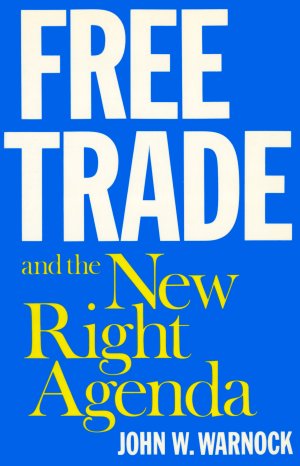Free Trade and the New Right Agenda : The Impact on Canada | How the Corporate Sector Has Determined Canadian Political Economy

Free Trade and the New Right Agenda
by John W. Warnock.
Vancouver: New Star Books, 1988.
ISBN: 0-919573-79-7
On October 5, 1987, the Canadian government headed by Brian Mulroney and the U.S. administration headed by Ronald Reagan announced that they had reached a basic agreement on a comprehensive bilateral free trade agreement between the two countries. President Reagan declared that "the U.S./Canada free trade agreement is a new economic constitution for North America." The Canadian prime minister proclaimed that the new agreement would result in a net increase of 350,000 jobs for Canadians and would permanently end regional disparities.
The defence of the deal began immediately, using some very strong language aimed at would-be opponents. The chief Canadian negotiator, Simon Reisman, informed Canadians that they could all expect a 25% increase in their real income and that those who opposed the deal were engaging in the "big lie technique" used by Nazi Germany. The Minister of Finance, Michael Wilson, told a gathering of high-profile businessmen in New York that Canadians opposed to the agreement were "dominated by fear and weak of will."
There is no question that everyone, opponents and defenders, agreed that a free trade agreement with the United States represented the most far-reaching change that Canada faced since Confederation. The agreement has little to do with trade or trade disputes. It is primarily about investment rights. It has commonly been referred to as the new "Business Charter of Rights." As Eric Kierans pointed out, Canadian corporations wanted U.S. citizenship rights, and they got them. The key aspects of the agreement remove barriers to investment for both American and Canadian businesses. The major push for the agreement, on both sides of the border, was the large business organizations.
Canadian institutions fell into two separate camps on the free trade agreement with the United States. Typical of the supporters of the agreement were the Canadian Chamber of Commerce, the Canadian Manufacturers Association, the Canadian Bankers Association, the Investment Dealers Association of Canada, the right-wing think tanks, and most of the professional economists.
Those organizations opposing the agreement included the Canadian Labour Congress, the Canadian Teachers' Federation, the National Farmers Union, the United Church, the Coalition of Senior Citizens Organizations, the National Action Committee on the Status of Women, the Assembly of First Nations, and the Canadian EcoNetwork.
In 1983, while running for the leadership of the Conservative Party, Brian Mulroney stood with the opponents of bilateral free trade. He declared that any such agreement with the United States would be "a danger to Canadian sovereignty." However, across the border Ronald Reagan had been agitating for a new North American Accord since his 1980 race for the presidency. The U.S. government, working through the three main Canadian business organizations, actively promoted the new free trade agreement.
Free Trade and the New Right Agenda explains why the large corporations on both sides of the border were the driving force behind the Reagan/Mulroney deal. It locates the issues and events in the context of the economic crisis of the 1970s and 1980s, the political and economic agenda of the New Right, and the demand of the large corporations for the right to operate on a global basis, unimpeded by national governments.
The core of the book discusses the probable impact of the free trade agreement on a broad range of Canadian concerns, including regional disparities, the labour movement, agriculture and the food industry, women and the service industry, and the mass media.
JOHN W. WARNOCK is a political economist and sociologist who has taught at four Canadian universities, most recently the University of Regina, Regina, Saskatchewan. Over the past 25 years he has been active in many political, human rights, environmental and development education organizations. He is the author of Partner to Behemoth; The Military Policy of a Satellite Canada (1970); Profit Hungry; The Food Industry in Canada (1978); and The Politics of Hunger; the Global Food System (1987).
NOTE: Free Trade and the New Right Agenda is out of print but available from Amazon Books and other used book dealers.
 I continue to put out new articles and material that you can find on my blog at blogspot.
I continue to put out new articles and material that you can find on my blog at blogspot.
